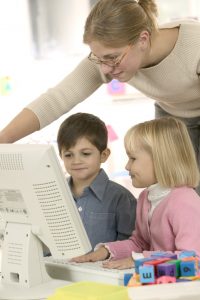Even before they are born, some children have an emerging digital footprint, as images of pre-natal scans are shared online and Facebook has it’s ‘child expected’ status up for people to share and see. What will that mean for how they handle their online information in the future, and how do we start to make sure that they will be able to act online responsibly and safely through their childhood and beyond?
 I have been reading some fascinating research by AVG Digital Diaries, an on-going international study into how technology is changing childhood. There are some pretty amazing insights in there, from the 7% of babies who have an email account set up for them by parents, through the 3-4 hours a week spent online by 6-9 year olds, and the latest piece of research which states that most children are already social media adults by age 13 – which means they are capable of accessing and using the social media sites that you do with at least as much skill and ability – albeit without some of the life skills and experience you have picked up along the way.
I have been reading some fascinating research by AVG Digital Diaries, an on-going international study into how technology is changing childhood. There are some pretty amazing insights in there, from the 7% of babies who have an email account set up for them by parents, through the 3-4 hours a week spent online by 6-9 year olds, and the latest piece of research which states that most children are already social media adults by age 13 – which means they are capable of accessing and using the social media sites that you do with at least as much skill and ability – albeit without some of the life skills and experience you have picked up along the way.
I know children grow up much faster these days, faced with all the external influences that seems inevitable, but the internet can offer both a fantastic learning and life-skill opportunity, and also a social and real threat.
With lives lived from the start online, computers, games consoles and mobile phones offer increasingly diverse ways of accessing online content and contacts while at the same time proving more problematic for parents to monitor. More recent research in the UK shows that a third of under-tens ‘own mobiles’ and that parents often don’t monitor effectively their children’s use of the internet across a range of devices.
As a mum of two young children who enjoy watching their favourite tv shows online and playing simple online games, I have the responsibility to ensure that they grow up as able and aware digital citizens. Along with most parents the simple things I want for my children are for them to be happy and to be safe, and leaving them to surf online, make friends and contacts unsupervised, is completely the opposite of the standards I have in the real world to achieve those goals.

What we need to do collectively and individually as adults is to ensure our children’s online activity is supervised, and that we are involved in that activity, that time spent on line is well used and not wasted, and that from the beginning smart limits are set that will allow children to master online media rather than it mastering them.
The UK Government is considering mandatory content filters net connections accessed by children, which may be a part of the answer, but it won’t beat the hands-on guidance of parents and trusted adults as we learn how to make best use of online resources, we should be sharing this knowledge and using to help guide our children’s future – and as they will have a much longer and in-depth digital footprint to manage, it might be time to stop posting their ‘cute baby bath photos’ online now!
Do you know what your children are doing online? Do you see it getting more difficult as they get older? What guidelines have you set for your children in accessing the internet? I would love to hear more, please leave a comment below.
Useful sites with further information
International charity Childnet, working on Access, Awareness, Protection & Policy.
Thinkuknow has some great information targeted at specific age groups – created by the UK Government’s Child Exploitation and Online Protection (CEOP) Centre.
Leave a Reply